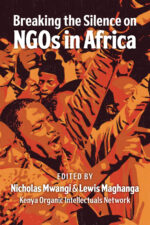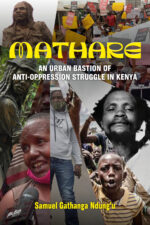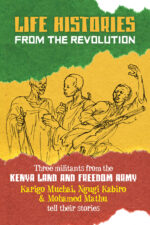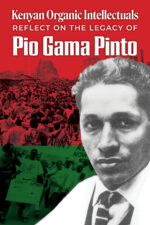-
Bongoman and the Aliens
USD $ 16.25Select options This product has multiple variants. The options may be chosen on the product pageBongoman and the Aliens
USD $ 16.25There have been a series of mysterious disappearances within Bongoman’s tranquil Eastlands Estate in Nairobi’s urban sprawl. The missing persons reappear days later with no recollection of where they have been and with altered personalities. In the course of his investigations, Bongoman bumps into an alien being who is also looking for him to enlist his services to help in fighting another alien race, building a force to annihilate humankind and take over the earth. Bongoman’s scepticism about the existence of aliens is tested as he finds himself forming an alliance of convenience with a star-hopper from a race that can move through dimensions and journey across space at will. Bongoman and his alien partner find themselves in a desperate race against time as they take on an aggressive race of aliens with seemingly invincible powers as they seek to undo what has been done and rid the world of this super race of invaders. In the war to save the world, the duo has to deal with aliens who have taken over the ‘essence’ of human beings and have mingled with the population. Bongoman must single them out and expel the alien within to save the poor souls.Select options This product has multiple variants. The options may be chosen on the product page -
MATHARE: An Urban Bastion of Anti-Oppression Struggle in Kenya.
USD $ 5.00 USD $ 15.00Price range: USD $ 5.00 through USD $ 15.00Select options This product has multiple variants. The options may be chosen on the product pageMATHARE: An Urban Bastion of Anti-Oppression Struggle in Kenya.
USD $ 5.00 USD $ 15.00Price range: USD $ 5.00 through USD $ 15.00History is written by the victors of any war. But what happens when the victors forget to write down their history or omit the cog of the struggle? This is the untold story of Mathare Slum that has never been told to the world: of the role it played in anti-colonial struggle and the planning ground for the Mau Mau struggle which culminated with the fall of the British Colonial Empire in Kenya in the midnight of December 12th 1963. Mathare has also played a critical role in anti-oppression struggle against the four regimes that we’ve had since independence and continues to do so up to date. This history has not been documented and has only been done piecemeal. This has overtime eroded the rich history of Mathare and led to a distorted history of once a planning ground and a bulwark of Kenya Land and Freedom Army (KFLA). The current generation are not cognizant with the critical role Mathare played in the independence of our country. Presently, Mathare is majorly known for all the negative reasons and its proximity to Mathari Mental Hospital has contorted its image to the outside world. My story tries to re-tell the history of Mathare from an informed insider perspective by threading the struggles from the colonial era to the present day and the role it has played in agitating for social justice. My story brings to view the past history of this informal settlement in the heart of Nairobi, the present struggle and the promising future through community organizing.
Select options This product has multiple variants. The options may be chosen on the product page -
Bongoman and the Golden Boots
USD $ 16.25Select options This product has multiple variants. The options may be chosen on the product pageBongoman and the Golden Boots
USD $ 16.25Bongoman stumbles upon a pair of magical football boots that have the ability to transform the wearer into a football wizard. His legendary love for football induces him to try out the boots, with spectacular results. With his new incredible ability, he suddenly becomes a maestro on the pitch. His brilliant dribbling and scoring tactics attracts international attention and several international premier football teams start seeking him with handsome offers for his services. Bongoman comes to face with the ugly face of game fixing and dirty practices, leading to threats to his life and family. After a series of unsettling incidents, including the kidnap of his nephew, Bongoman decides to play for his local team, but the malpractices run deeper than he had imagined and the mandarins controlling the game he so loves will give him no peace. He has no place in the game if he does not do as they say, but he cannot give up his strong principles for money or fame. Bongoman is in a quandary. Does he abandon his passion for good? Should he take the fall? That is out of the question! His only option is to take the criminals controlling football in the country out of the equation.
Select options This product has multiple variants. The options may be chosen on the product page -
Bongoman and the Magic Potion
USD $ 15.00Select options This product has multiple variants. The options may be chosen on the product pageBongoman and the Magic Potion
USD $ 15.00Bongoman’s old friend, ‘Prof’, invents a potion that gives that gives someone superhuman strength when ingested, but his assistant, seeking personal benefit, steals a few vials for sale to some shadowy underworld boss. After the gang boss kidnaps the professor’s assistant to get hold of the magic potion’s formula, the professor seeks Bongoman’s assistance to get back his assistant from the crook’s clutches. One of the gang boss’s minions has taken the stolen magic potion and now possesses prodigious strength, wreaking havoc in the neighborhood and imposing a siege on the population. Bongoman must employ all his wits to outsmart his new nemesis. Bongoman finds himself in a full-scale war with an organized criminal gang. He must fight for the soul of his cherished neighborhood. The helpless police also appeal for his assistance in taking down the gang of cutthroats threatening the peace and turning Eastlands into a battleground. This is going to be a bare-knuckle brawl where no prisoners will be taken.
Select options This product has multiple variants. The options may be chosen on the product page -
Bongoman and the Pirates
USD $ 13.00Select options This product has multiple variants. The options may be chosen on the product pageBongoman and the Pirates
USD $ 13.00Bongoman wins the lottery and believes this is the answer to all his financial woes. He plans to get into the transport industry by purchasing a ‘matatu’ (passenger van). He seeks a vehicle dealer to assist him import a van but a few days later, Bongoman learns that the ship importing his vehicle has been hijacked by Somali pirates in the Indian Ocean off the coast of Kenya. With nowhere to turn to for help, Bongoman decides to take matters into his hands. He must travel to Somalia and get back his vehicle! As he embarks on his mission, he unearths the allies of the hijackers who lay a trap for him. He finds himself stranded in the middle of the Indian Ocean where he has to battle sharks, thirst and exposure. He overcomes these obstacles but falls into the hands of the hijackers, who consequently imprison him. Bongoman worms his way into the hearts of his captors after preparing a delicious meal for them and even accept his offer to join them as cook and soldier. The pirate boss orders him to accompany them to hijack another ship and after the attack goes awry, Bongoman miraculously manages to escape capture by an international anti-piracy force. Will Bongoman get back his vehicle? Will his transport business become a reality?
Select options This product has multiple variants. The options may be chosen on the product page -
Bongoman and the Warlords
USD $ 14.00Select options This product has multiple variants. The options may be chosen on the product pageBongoman and the Warlords
USD $ 14.00Bongoman lands a job as a reporter and his first assignment for the News Daily is to cover the ongoing war in Somalia between the Transitional Government of Somalia and militant groups in the war-torn country. Bongoman boards a plane to Jowar but due to bad weather the plane is forced to land in Mogadishu, the last place Bongoman wanted to find himself in. The lawless nature of the battle-scarred city catches up with him soon enough. He finds himself at the wrong end of a gun at every turn. He meets an old friend who has a penchant for attracting trouble. To his shock, he learns that she’s running guns for one of the main warlords in the city. He tries to extricate himself from her company but the situation escalates and they both end up in the hands of a regional warlord, who sees in them handsome ransom rewards. An old friend helps Bongoman and his companions escape from their dingy dungeon but they have to contend with a terrorist armed with an RPG. Bongoman has been shot at, blown up, kidnapped and buried in a landslide. It’s time to go back home… but will it be that easy?
Select options This product has multiple variants. The options may be chosen on the product page -
Bongoman Strikes Gold
USD $ 14.00Select options This product has multiple variants. The options may be chosen on the product pageBongoman Strikes Gold
USD $ 14.00Bongoman bumps into his perpetually broke friend, Rastafasta, driving a flashy car. Rastafasta discloses the secret to his new-found wealth; he is involved in the gold trade. There is a thriving gold business in the mines of Ikolomani, a bustling little town about 350 km from the city. Bongoman embarks on an epic journey to this Eldorado, with dreams of making big money. Halfway through the journey, the bus breaks down and impatient to get to his destination, he disembarks and continues the journey on foot. He jogs through hills and valleys, hour after hour and finally, thirsty and exhausted he finds himself in a dingy bar where he ingests a potent alcoholic brew unknowingly. Shaken but unfazed he continues his journey which is cut short after a gang of robbers posing as passengers hijack the passenger van he is travelling in. After a decisive reckoning with Bongoman, the robbers find themselves behind bars as Bongoman walks away with a hefty bounty derived from their capture. This windfall quickly evaporates after the crafty van driver spikes his drink. He finally arrives at the gold mines of Ikolomani and to his utter dismay, finds that all is not a bed of roses…
Select options This product has multiple variants. The options may be chosen on the product page -
Bongoman vs Mother-In-Law
USD $ 13.00Select options This product has multiple variants. The options may be chosen on the product pageBongoman vs Mother-In-Law
USD $ 13.00Bongoman’s ill-tempered mother-in-law arrives for a visit. Bongoman is far from thrilled as he doesn’t see eye-to-eye with the old lady. She never has a kind word for him, calling him a good-for-nothing bum. The tranquillity of the Bongoman household is turned upside down as the old lady imposes her uncompromising will, harassing Bongoman at every given opportunity, especially his evening forays to the neighbourhood pub. With no peace of mind, Bongoman pushes back and devises a series of tricks to force her out of his house. None of the tricks works out, and Bongoman finds life unbearable in his own house. He reports an assault against him by his mother-in-law to the police but finds himself in jail as the perpetrator of the assault Bongoman storms out of his house in protest after a brief interlude in jail, taking up residence in the local park, where he has to contend with some unsavoury night-time characters for rights to the more comfortable sleeping spaces and has to fight to assert his position in the pecking order. How will Bongoman rid himself of this terrible relative? Does he have any more tricks up his sleeve?
Select options This product has multiple variants. The options may be chosen on the product page -
Life Histories from the Revolution: Three militants from the Kenya Land and Freedom Army tell their stories
USD $ 5.00 USD $ 18.00Price range: USD $ 5.00 through USD $ 18.00Select options This product has multiple variants. The options may be chosen on the product pageLife Histories from the Revolution: Three militants from the Kenya Land and Freedom Army tell their stories
USD $ 5.00 USD $ 18.00Price range: USD $ 5.00 through USD $ 18.00In the early 1970s, Donald Barnett — who worked with Karari Njama to produce Mau Mau From Within (published by Daraja Press) — also worked with three militants of the Kenya Land and Freedom Army to enable them to tell the story of their experience in fighting for freedom and against British colonialism. These rarely acknowledged militants were Karigo Muchai, Ngugi Kabiro and Mohamed Mathu. Their stories were published in 1973 by LSM Information Center (Richmond, British Columbia, Canada) as part of a series entitled Life Histories of the Revolution, as The Hardcore: The Story of Karigo Muchai; The Man in the Middle by Ngugi Kabiro; and The Urban Guerrilla by Mohamed Mathu.
As part of its mission of Nurturing reflection, sheltering hope and inspiring audacity, Daraja Press is please to republish the three booklets as a book that will help a new generation of activists — Kenyan and international — reflect on a history that might inspire audacious struggles to continue the struggle for freedom that was the goal of the Kenya Land and Freedom Army.
Donald Barnett’s introduction to each booklet contained the following text:
The life histories in this series have been recorded and prepared as historical documents from the revolutionary struggles of our time. The techniques and methods employed at each stage of the process, from initial contact to final editing, have therefore been chosen or fashioned with the purpose of guaranteeing the authenticity and integrity of the life history concerned. These stories, then, to the best of our ability to make them so, constitute a body of data and testimony as revealed by a few of those history-makers normally condemned to silence while others speak on their behalf.Select options This product has multiple variants. The options may be chosen on the product page -
Kenyan Organic Intellectuals Reflect on the Legacy of Pio Gama Pinto
USD $ 5.00 USD $ 11.00Price range: USD $ 5.00 through USD $ 11.00Select options This product has multiple variants. The options may be chosen on the product pageKenyan Organic Intellectuals Reflect on the Legacy of Pio Gama Pinto
USD $ 5.00 USD $ 11.00Price range: USD $ 5.00 through USD $ 11.00This booklet on Pio Gama Pinto has been produced in the tradition of ‘looking back, in order to move forward’ to not only salvage history but also to use it as a mirror to reflect on the current political, economic and social conditions in Kenya. The essays, dubbed reflections, that appear in the booklet are a product of the efforts and dedication of young women and men under the banner of the ‘Organic Intellectuals Network’ in Kenya. We use the concept of ‘organic intellecutal’ as developed by Antonio Gramsci.
Members of the Organic Intellectual Network selected the book Pio Gama Pinto: Kenya’s Unsung Martyr 1927-1965 by Shiraz Durrani (Vita Books, 2018) as a basis for discussion for celebrating and remembering the life of Pio Gama Pinto, Kenya first Martyr, a dedicated and selfless individual in the struggle for freedom in Kenya.Select options This product has multiple variants. The options may be chosen on the product page -
Select options This product has multiple variants. The options may be chosen on the product page
Undaunted: Stories of Freedom in a Shackled Society
USD $ 15.00….to free oneself or assist in liberating others involves taking risks, being suspicious of the status quo, leaving the safety of the shore and launching out into the deep and the unknown. This is a very lonely calling too as one immerses oneself into the whole of reality with courage to confront and listen. Yet, the calling is not to be the liberator of the oppressed but to make a commitment to fight alongside them, as Paulo Freire wrote in Pedagogy of the Oppressed. — Fr Gabriel Dolan
From his work in Turkana, Kitale, Kapenguria and Mombasa, Father Gabriel reminds us that true transformative change comes from the people themselves, from the bottom up. This is a challenge that the social justice/human rights practitioners must internalize and the sooner the better. The idea of being the “voice of the voiceless” must transform to facilitating, encouraging and giving space to those who suffer the indignities of injustice, violence, poverty and repression. Indeed, one of the most significant tasks for the human rights community is to devolve away from Nairobi, in real, practical, and substantive ways.
It is not easy for a white man, with all the attendant privileges that brings, to become an integral part of the struggle for pro-poor transformative change in Kenya, and be subject to arrest, harassment, and repression. For those who read these memoirs, please circulate them to everyone you know. Translate them, read them in the mosques, churches and under trees so that Kenyans can get a sense of where we have come from, what we should avoid, and what it takes to make some gains that benefit the majority of our people. — Maina Kiai
Select options This product has multiple variants. The options may be chosen on the product page -
Ghostlines – Re-Drawing the LAPSSET Corridor in Kenya
Ghostlines is a graphic novel that describes the journey of the author and three Kenyan artists along the LAPSSET development corridor, a braid of roads, pipelines, and resort cities that promises to bring development to Kenya’s marginalized north. It mixes conceptual and empirical insights into the human geography of infrastructure with the narrative flexibility and depth afforded by the medium graphic novel – a geo-graphic novel.
They meet Peter, a retired pilot who had previously worked for a conservancy and can tell stories about the LAPSSET from high above and from the ground. He understands how everyone involved is seeking to benefit from the corridor in their own way, even if that means building uninhabited “ghost huts” that manifest the presence of pastoral communities and thus qualify them for compensation. Jane is an activist for a women’s and Indigenous rights organization. She’s been fighting invisible monsters her entire life: stalking hyenas (metaphorical and real), corrupt politicians, and the patriarchy itself. The spectre of the LAPSSET is only the last one of these hidden monsters. They meet Joseph, a herder, who hopes that the LAPSSET might connect him to far places but worries that it will instead cut him off of the grazing grounds that are essential for the survival of his family. What is the LAPSSET – a road or a fence? In Oldonyoro they meet Rashid, a poet, who writes about the long history of the corridor. In his mind, it reaches far back to colonial times. “My grandfather suffered greatly,” he writes, “Is it my turn to face the worst? I wonder, a tricky treasure”. In the last village on their journey, they meet a group of women who have come together to support each other. Their position on the LAPSSET is more optimistic. The real connections of solidarity they forged contrast with the imaginary ghostlines of the LAPSSET. The narrative structure of the geo-graphic novel draws connections between the narrators, that is, the team of researchers and artists and the interviewees. They seek to unravel the idea of the omniscient or unbiased narrator and to reveal how storytellers bring their own ghosts into stories. By connecting all of these narratives along their journey, they challenge the single, universalist story that planners tell about large-scale infrastructure projects. Instead, they invite the reader to embrace the often-contradictory multiplicity of infrastructural relations, to see the ostensibly solid lines on maps for what they are: a messy, ever-changing braiding of multitudes.













